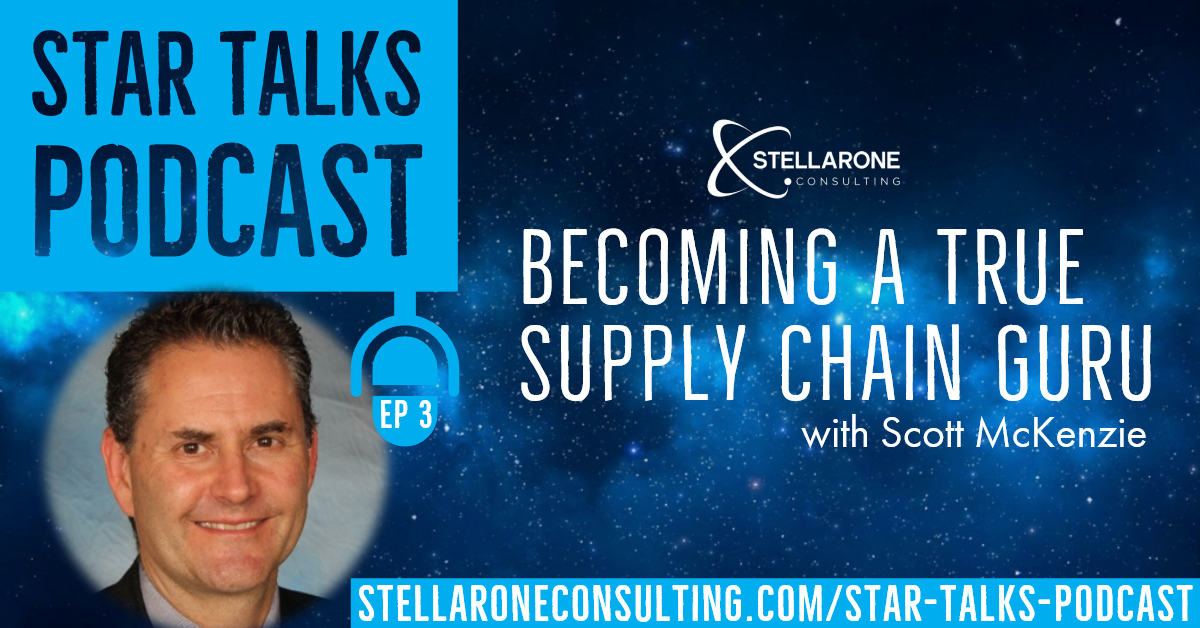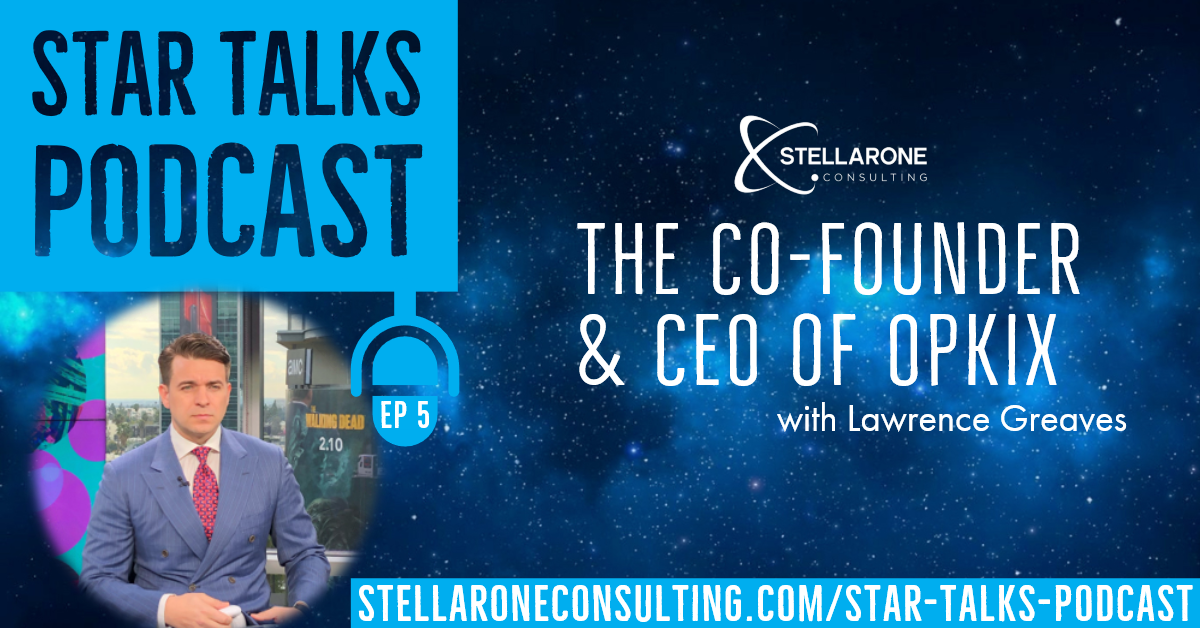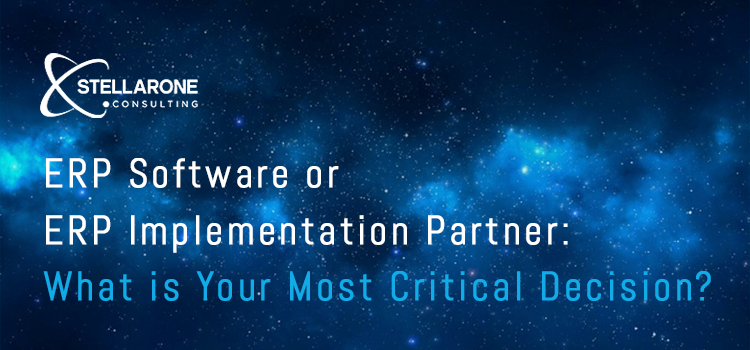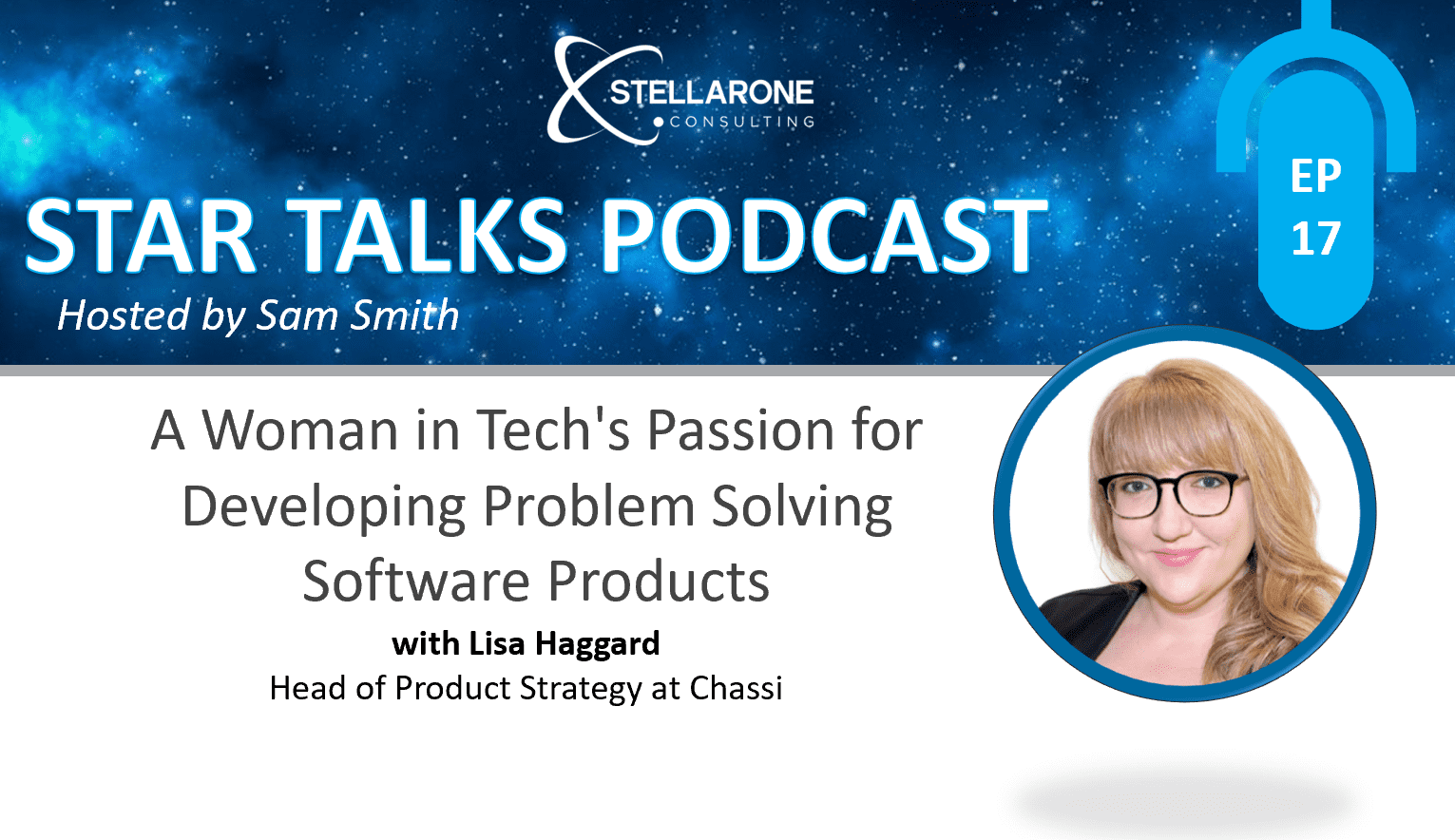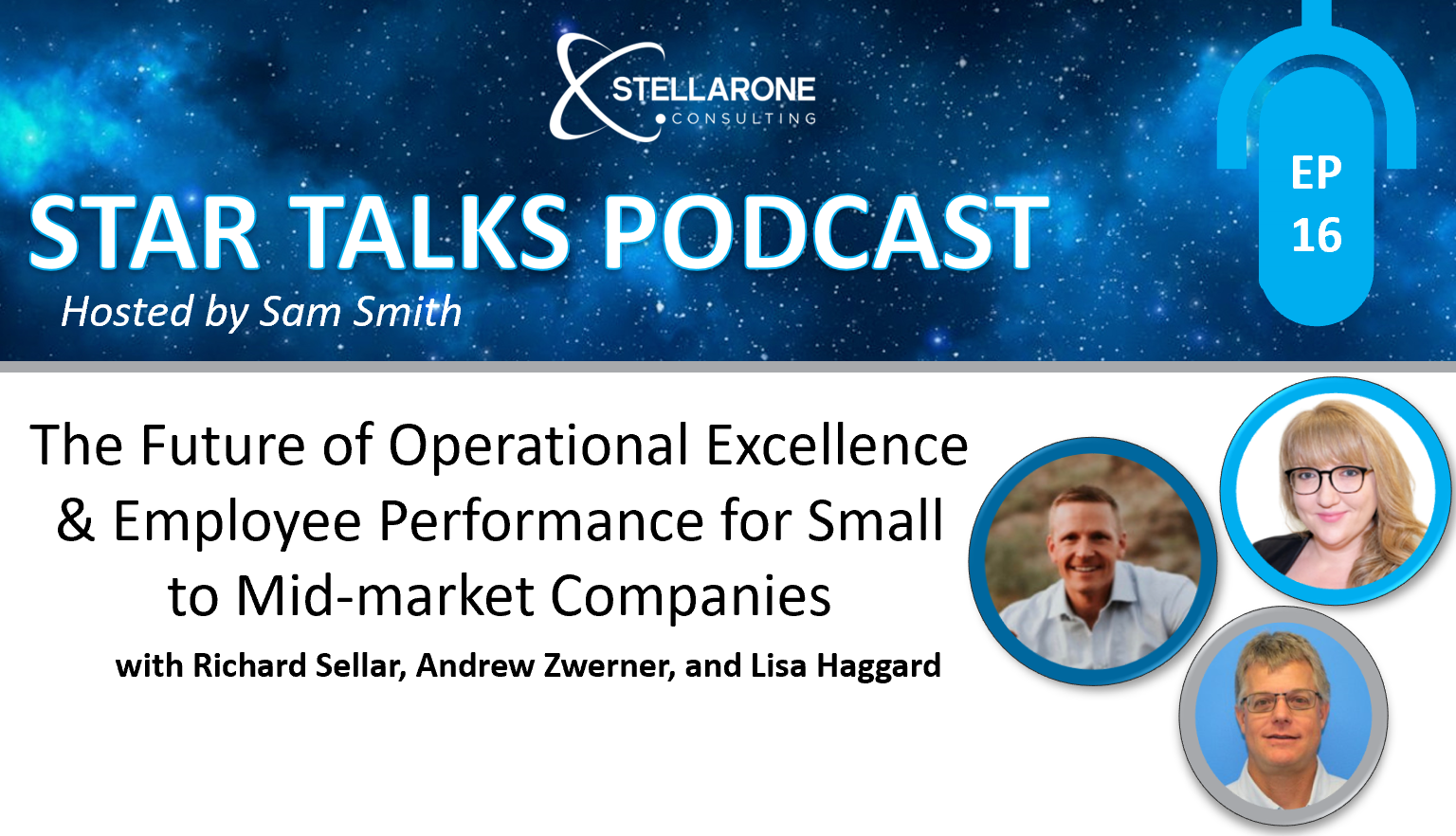Star Talks: Episode 4 with Steve King: Star Talks is the podcast of small conversations that inspire you to do big things, and on this episode Steve King, Managing Director at First Wave Client Solutions, shares about how a summer job working for his uncle acted as a catalyst when choosing his career path.
In this episode of Star Talks, Steve King sits down with us to talk about:
- How a summer job at his uncle’s construction company inspired him to get an Engineering System Degree from MIT
- Becoming an expert at rapidly and successfully integrating newly purchased companies
- Learning to put Solution Readiness into practice to help companies avoid failed technology implementations
About Steve:
Steve has over 20 years of experience serving clients across multiple industries. Being skilled in operational strategy development and implementation, Steve has a passion for solving complex business problems and helping lead organizations to higher levels of performance.
Duration: 00:27:00 | Recorded: June 26th, 2019
Ways to connect with Steve and the Stellar One Team:
Steve King - LinkedIn | Email - SKing@FirstWaveCS.com
Podcast Episode Links - Apple Podcast | Google Play | SoundCloud | Stitcher | Spotify
See all Episodes here - Star Talks Podcast
Stellar One Consulting Social Media - Facebook | LinkedIn | Twitter
Here's the episode transcript:
All right, Steve, thank you so much for joining us here.
Steve: (01:12)
It's my pleasure. Thanks for having me.
Awesome. Um, so tell us a little bit about where you're from and what it was like growing up.
Steve: (01:19)
Well, I grew up here in Southern California. I'm a Southern California native. Uh, I had a great childhood where I was really a student and an athlete. I had a strong family. My dad was an optometrist, my mom was a dental hygienist. Um, I really enjoyed school. Uh, I was good in math. I was good in science. Uh, this was the early eighties, and I taught myself to program computers. And, um, I was also as a, I was a pretty good football player. I wasn't quite [inaudible] caliber, but there was certainly was, uh, opportunities to go to, uh, some of the military academies and play ball. But my folks had also convinced me to apply to MIT and I wound up getting accepted, uh, which was super exciting, but also a little daunting for a native California kid. Um, and I was actually struggled with the decision as to where to go to school. But I, I remember a conversation with my father, uh, where he said, you know, Steve, you got accepted to MIT, you kind of have to go. So off I went to, uh, to pursue an engineering degree.
So you went and got an engineering degree. Engineering systems degrees specifically. So why did you pursue that discipline?
Steve: (02:47)
Yeah, that's right. Engineering systems was a kind of a new thing at the time and it was a new degree, uh, at the university. Um, aside from my dad who was the optometrist of my uncles and my grandfather owned construction companies, uh, of different forms and I had worked for one of my uncles, uh, it towards the end of high school and then my first couple of years of college as well in the summers, um, as a laborer. But that's where I started to get some exposure to civil engineering and also construction management. The summer after my sophomore year of college, uh, I was going to go back to work for my uncle again, but he had just purchased a new computer system to run his business and had had it for about, it was five or six months, uh, and had done almost nothing with it. My aunt was trying to install it. She kept the books for the company. Um, but she was trying to do it on a part time basis. So my uncle said to me, Hey, instead of working in the field this summer, would you mind taking a shot at installing this computer system for us? You know, computers, right? I said, sure. Um, I'll take a shot at it. And I tell you, I, I took to that instantly.
Steve: (04:10)
Um, I, I had a pretty good knowledge of accounting already, uh, from some coursework, uh, that I'd had at school. Uh, I understood computers, I understood computer systems, uh, and networks a little bit. Um, and I was, I spent the summer implementing an application in an area where I had expertise because I'd actually worked as, as a laborer, right, on these types of projects. And so, you know, it really was one of those moments where I thought, wow, I'm using the things that I learned in school, in the real world. And you always hear kids say that right? When they're growing up, it's like, what am I going to do with this? Well, I had one of those moments where this is what I do. And, and I just loved it. Um, so when I got back to school and after the second year, we really had to kind of double click into, uh, you know, here's my specific major.
Steve: (05:07)
Um, I looked at engineering system engineering systems. Um, it was part of the department of civil engineering, but it really was civil engineering with a super heavy focus on using computers to do numerical analysis and solve problems. Um, and I love that kind of work. It turned out, uh, for me to be a great choice because another one of the overlaps with that was it had a heavy overlap with the MBA curriculum at the Sloan school or the MIT school of management. So by the time I'd finished up the degree, I'd also done the first year of the MBA program as effectively as electives, uh, as part of my engineering degree.
Huh. So you went into over the summer basically implementing a system for your family's company and then that actually directed you to what you ended up majoring in.
Steve: (06:07)
It did, it had a heavy influence in that. And also, um, eventually had a head heavy influencing my career choice.
So you've been a management consultant for high profile organizations over the past 30 years. Why did you get into this line of work?
Steve: (06:24)
Well, going back to that, that summer with my uncle, um, when I did that work, I thought it was construction, but what it really was, was it or what was called at the time as data processing. So I'm dating myself, but it, it really took me a year and a first job to figure out that that's what I wanted to do. I came out of school into a construction management job. Um, and about nine months into that I figured out that's not quite where I wanted to be. And I started exploring, uh, opportunities in data processing and through that, um, figured out that it was kind of the primary way to get into the big eight at the time management consulting firms. Um, I wouldn't say I was particularly well informed when I did this, but I landed in a good place. I landed at Anderson consulting, which is now Accenture and I really loved everything about it. Right. That was the, uh, uh, blend of business and technology, much like I'd done in that summer with my uncle, I had the opportunity to work with a wide range of clients and go to different companies and learn about those businesses. Um, and they're really also part of, part of that was the culture at the organization and a like is super high bar of what the expectation is to serve clients. And that's something that, um, I just, I just really liked the rigor and the discipline and the, the seriousness with which we approached every client engagement and that was just a great phase of my career. The learning like really never stopped in there. And it's, that's one of the things that even today I will oftentimes share with uh, young or new graduates that if they can land at one of those types of companies and, and uh, it's super competitive these days, but they have some of the best training and development paths and that's something that still to this day I feel like has helped me immensely throughout my career.
I noticed in the first half of your career, you led some pretty successful initiatives in the semiconductor and electrical components, distribution space in particular your work at Isupply. Tell us what Isupply is, and what did you do there?
Steve: (08:59)
So yeah, I did work quite a lengthy time in semiconductors and that was something I began to specialize a little bit in at Accenture. Um, and I did make the jump to I supply now it was 1999, so I'll call it a .com startup. Um, but it, it really was more than that. Um, it really was, uh, a supply chain information company. Um, the, it was, it was founded by a man named Dr. Derek Lidow and Derek is, uh, he had formerly been the CEO at one of my clients international rectifier. And now Derek has since then moved on and he's a professor of entrepreneurship at Princeton. Just a super intelligent guy and a great guy all the way around but just incredibly smart. And he had a vision. His basis of, of this company was to establish what at the time, late nineties, uh, was leveraging new internet technologies to establish a company that ran a marketplace, uh, and had a back end, uh, supply chain engine and management engine to run a marketplace for electronic components and then use the data that flowed through that marketplace, the volumes, the supply demand picture, um, even the pricing to generate truly useful information. And at that time that was very forward thinking. Um, and it was a fantastic kind of a concept for us to go build. So we were funded. I came on as employee number two. I was the VP of operations. I was in chance, uh, in charge of building out, uh, the, the IT and the operational infrastructure for the business. Uh, we, we put together a, um, a web front end over an ERP. It was a JD Edwards ERP instance, uh, to manage this flow of products. We put all of that together very quickly. I think it took about four months. Um, and we, we build this and we had some early stage customers that we brought on and we managed the flow of hundreds of millions of components, um, through this network. Um, what happened at the time though is that as the business landscape was evolving.
Steve: (11:37)
The contract manufacturers, the big companies that are not actually selling the products that they build it for, the, the original equipment manufacturers that sell, um, were really taking hold and becoming super powerful entities in this electronic supply chain and still are today, right? They're the biggest builders. Um, but we just couldn't quite break into that but what we did in that process was stay nimble and rethink the business, uh, and shift more to, um, research based information as opposed to information that we were gleaning off of this network. Uh, and through doing that and kind of evolving the company, we're able to keep the value up through a sale. Um, even though it wasn't the exact, uh, you know, objective we started with, it still was a successful venture that sold. So, you know, an exciting time. And that was my first taste of entrepreneurship as well.
Very interesting. So there's a lot of interesting things about your background. Um, and one of those is your time as the Southern California practice director for point B where you developed and implemented operational strategies for a lot of different organizations. So can you tell us a little bit more about what you did there?
Steve: (12:59)
Sure. And, and what I did there, uh, for the second half of my time, uh, was lead the practice in Los Angeles and orange counties. Uh, and that over time actually became effectively a full time job. Um, but I also as part of that wound up taking on a number of functional internal leadership roles, uh, including, I led a business performance management function for, it was a little over two years, uh, internal in the firm. So I was kind of, the firm was my biggest client in that time period. And, uh, it really gave me great insight to the operations of services businesses. Um, when I, you know, really had spent all of my career so far with products type firms, um, but also during my time with point B, um, what I would say was, was my favorite work there. Uh, really centered around acquisition integration when a company would buy another, uh, company or also on the acquired entity side.
Steve: (14:06)
Um, but when those transactions happen, uh, those are areas where clients always have like really high expectations for the, uh, the revenue boost they're going to create as well as the cost reduction. They're going to be able to, um, create. But these companies also struggle tremendously with execution. And that's very common. There've been some firms, you know, over time that had been very good at acquisition integration. Cisco was that firm for a long time. Um, but most companies really struggle in that space. And, uh, it's because those programs are complex. They're super cross-functional, they really touch, you know, every aspect of the business. Um, and they need to be done fast. And so this was always an area when I was able to work in it and get things done. Um, get companies integrated, um, where I felt like, you know, I'm adding such a tremendous amount of value doing this type of work. Very satisfying.
So fast forward to today and tell us what you're doing.
Steve: (16:24)
Well, so after, after 10 years at Point B in 2017, uh, I finally made the, the entrepreneurial jump to start my own consulting business. And that's the First Wave client solutions. Um, this was a big move, you know, for me at the time, it was with a, uh, know, very stable organization, but it's something that I had had my eye on for a long time. And, and wanted to, uh, to do, you know, on my own. The, the key for me in setting it up and I, I'd mentioned that, you know, running the practice had become really kind of a full time job. The key for me was getting back to the client facing work and being engaged with clients directly. So I set it up in a way that, um, I am personally involved with, you know, each of our clients. Uh, we work most mostly with mid sized companies and you know, midsize divisions within larger companies.
Steve: (17:25)
Um, I'll share, you know, what I've heard a little bit in the marketplace, um, and that is that firms in general or optimistic about the future, but cautiously optimistic and I think rightly so. Um, but a lot of them, when I talk with, with operational folks in particular, um, and also on the, on the demand creation side, on the sales side, the concern, uh, that they, that they worry about a lot is also scalability and being able to keep up with demand, um, that they are again, cautiously optimistic about. Um, so what we do is work with these clients to ensure that their business strategy has a parallel operational strategy that's clear. Um, it's consistent, it's well understood, and then stick around and help them to implement the solutions that, uh, that they need.
So as you know, many, many of our listeners are operations professionals at small and midsize manufacturers and distributors primarily. Um, what one of the things that you've specialized in is technology solution readiness. Describe to us what solution readiness is and what are some of the critical focus points that leaders at these companies need to be acting on?
Steve: (18:51)
Yeah, that's a great question because almost always these days, any significant operational change has a material technology component to it. Uh, technology, you know, it continues to play a larger, larger role across all business processes from, from front end demand creation through to the traditional demand fulfillment functions. Um, you know, new fulfillment models and go to market models, backend support functions, you name it. Uh, technology is not just supporting that anymore but really driving change in a lot of cases. Um, and these are solutions that can drive bottom line value. They can increase sales, they can reduce costs, but very often companies fail to realize the, the full intended benefits of some type of a technology implementation. Um, solution readiness focuses on ensuring that a company has its fundamentals in place that's going to enable them to realize the value of the investment once it's been implemented. Um, that's accomplished through a set of rapid operational assessments and fixes oriented and getting those key elements in place and the types of things that come up.
Steve: (20:14)
You know, examples of things that might show up in an assessment are during a warehouse review. You see product that has made its way into a corner and it's not in a named location. And, and it doesn't have a home or you're on a factory floor and you see a buildup of whip or, or even through factory reporting, you understand cycle times are not really where they need to be. These are typical operational issues that will show up that are generally process and related more so than technology related. And they won't be solved by just plugging the technology and without making some additional changes. And while these things can seem like simple issues, anybody who has run a factory or has managed a warehouse knows how, how challenging they can be and they also know that, that they won't get the full value from the technology if those things are still out there. Um, and that, you know, that's the interesting thing I think about taking structured steps to evaluate the, the processes that you're getting after with a new technology solution. Um, it's a trade off and there's certainly value to moving quickly and not getting bogged down in perfection, but spending a little bit of time up front, um, and in a structured way to ensure your position to adopt that technology pays off tremendously downstream. Uh, there've been such incredible and empowering advances in business solutions over the past decade or two. Most of those things now warrant spending that time.
So you've alluded to to it briefly here, there's, there's no doubt that we're in a transformational period, call it what you want and industrial revolution, digital transformation. Richard Seller called it the second Renaissance of business management software on episode two of Star Talks. How would you characterize the impact that technology is having on business and what advice would you give to business leaders and entrepreneurs so that they can be successful?
Steve: (22:26)
Well, software and I think also hardware, um, continue to fuel advance advancements in both basic operational capabilities and also creation of new business models. Um, I think it can be tempting to jump on a new technology thinking this will drive benefits to my bottom line. And so I need this technology, but I believe it's, it's also important not to lose sight of the strategic side of the technology and the strategic side of the benefits that you're creating in addition to the operational, uh, improvements. So you know, as an example, a RPA, robotic process optimization, sorry, automation. Um, clearly RPA can, can deliver a wide range of benefits across all kinds of different applications. But it's also important to understand why you would be making an investment in RPA and how that relates not just to operational improvements but also to your competitive advantage. Uh, for example, if you compete on price, then leveraging RPA to cut costs in the customer service function, that might make good sense.
Steve: (23:45)
But if you compete on deep customer relationships, this may not be the best approach even though you might be able to drive some cost out that's not, may not be the right solution for your business or it may given some of the way RPA is evolving, but the understanding the, the strategic or the competitive advantage that's delivered by the technology as well as the operational benefits, uh, of the technology, understanding them both and um, deciding based on both of those is really paramount to having an implementation that in the long run is going to be viewed as successful. And that's another piece of a solution readiness is really starting with what's the strategy that's driving?
Yeah, it's an interesting point to said that the technology isn't just going to solve all of their problems. I've got to make sure that their, their processes and the things that they, the way that they run their businesses are in place so that the technology can help take them to that next level.
Steve: (24:47)
You bet. You bet. And that's been a problem I think with implementations or challenged with implementations since there've been implementations. Um, there's always folks that, uh, are focused very, very heavily on the technology and, and you need those on your project teams. Um, but to drive those bottom line benefits and ensure it stays aligned with your strategy, you've gotta be thinking about those things up front. And that's really the leader's response.
That's a great point. So tell what's the most rewarding thing about what you do?
Steve: (25:24)
You know I really enjoy my work and I've enjoyed it. Um, since I worked for my uncle. Right? Um, I, you know, as a consultant, it's really about making my clients successful. And that is kind of a generic statement and it comes in many forms. Um, large scale, bottom line business success is really the ultimate win for a consultant. But personally I'm a process guy and I get really charged up when we accomplish the objectives, but those things go smoothly for my clients. Um, so we meet the business goals, but the implementation also went well because we were exceptionally well prepared. Um, you know, when a client can say, I got there and the road wasn't nearly as bumpy as I as I expected it would be, that's when I'm super satisfied. Wow.
Well this has been great, Steve. I really appreciate you joining us on the show.
Steve: (26:32)
My pleasure. It was great to talk with you Sam.
If you'd like to suggest a guest, be a guest yourself, or if you have something you'd like to tell us, please send your message to StarTalks@StellarOneConsulting.com

